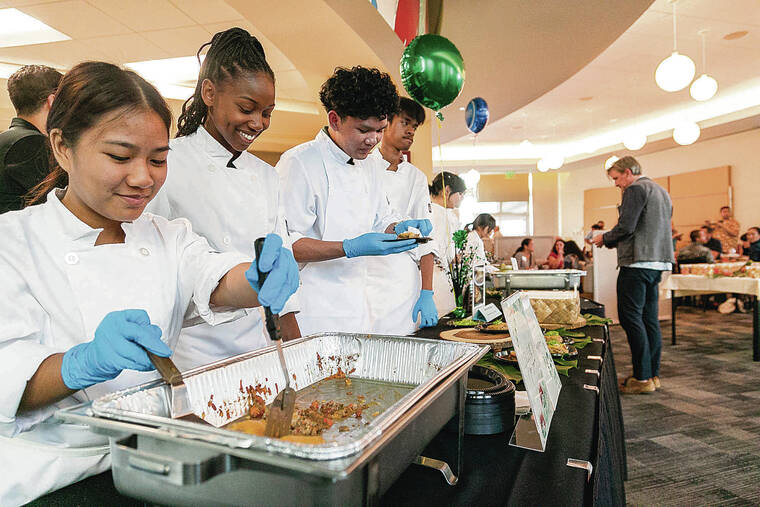Nearly a dozen recipes using locally grown ingredients are in the process of getting approved by the U.S. Department of Agriculture, and they could make their way to lunch menus in public schools in Hawaii and around the country.
At a Wednesday event at the First Hawaiian Bank’s downtown Honolulu branch, students from local high schools unveiled 11 recipes to guests that used four ingredients readily available from local farmers: kabocha squash, sweet potato, Asian cabbage and ground beef.
The recipes, prepared and taste-tested by students, are part of a project spearheaded by the Hawaii Child Nutrition Programs to develop local recipes that, once approved by the USDA, can be used in public schools around the country.
“What you see is the culmination of two years of work with all the partners that worked with us to try to promote local products and support local farmers and sustainability in the state,” said Sharlene Wong, program administrator for the HCNP, at the event.
The unveiled recipes included enchilada casserole, kabocha tofu Thai curry, Okinawan sweet potato country bread and curried kabocha and chicken stew.
The recipes, though created with Hawaii students in mind, could be used in other U.S. public schools once they become available in a USDA national recipe database.
“My big vision is that, after we submit these recipes to the USDA, we will have school districts across the country contacting our vendors here in Hawaii and asking us to ship (ingredients) … so they can make these recipes in their school districts,” Wong said.
The HCNP, a part of the state Department of Education, has worked with students from the Kapiolani Community College Culinary Arts Program, school cafeteria managers and others to develop the recipes as part of the USDA Team Nutrition initiative.
As part of the initiative, the USDA awarded $5.5 million to 21 states, including Hawaii, for fiscal year 2021 to develop the recipes and encourage schools to offer meals that use local agriculture and reflect local food practices and tastes.
The 11 recipes were among hundreds that were initially submitted by local families, farmers and school cafeteria staff. Last year, former Hawaii First Lady Dawn Amano-Ige picked the best recipes to be standardized by the USDA.
The development of potential school meals that utilize locally grown ingredients can be an important step in the right direction for the DOE’s Farm to School program, which includes a state-mandated goal for the department to procure 30% of the food served in public schools by 2030.
The Farm to School program would connect the DOE, sometimes referred
to as the state’s biggest restaurant, to small local farms, bolstering Hawaii
agriculture and allowing
the state to become less
dependent on imported food.
Hawaii currently imports about 90% of its food from out of state, which Lt. Gov. Sylvia Luke at the event said “is not good enough for us or our future generations. We need to make sure, in order to be self-
sustainable, we need to grow what we eat, and we need to eat what we grow.”
Whether the local recipes like those unveiled on Wednesday will actually make it to Hawaii public school menus is still dependent on other logistical factors, said Randall Tanaka, assistant superintendent for DOE’s Office of Facilities and Operations and lead for the Farm to School program.
The DOE’s Farm to School program, which was established in 2021, has been off to a sluggish start. One reason, Tanaka said at the event, is because high demand from the schools outweighs what small local farmers can produce.

